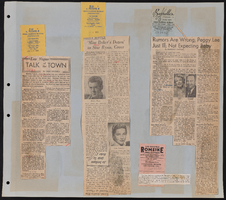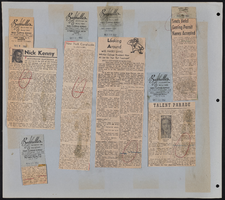Search the Special Collections and Archives Portal
Search Results

Transcript of interview with Fermin De Leon by Generoso E. Sayon, March 15, 1981
Date
Archival Collection
Description
Text

Transcript of interview with Hershel Brooks by Barbara Tabach, December 8, 2016
Date
Archival Collection
Description
Hershel Brooks was born December 3, 1930 in Brooklyn, New York. He was raised in an orthodox Jewish household, along with his four siblings, and attended Jewish community schools before pursuing his rabbinical studies. He studied at TelsheYeshiva in Cleveland, Torah Vodaath in New York, and Jewish Theological Seminary in New York. Before assuming his first rabbinical position, Brooks married his wife, Alma, and graduated with his BA from the University of Miami. He was first hired by a conservative congregation in Miami, and subsequently led congregations in Savannah, Georgia, Greensboro, North Carolina and Philadelphia, Pennsylvania. Eventually, he joined a temple in Anaheim, California, where he served for twenty years. In 1996, Brooks retired to Las Vegas. He was soon asked to lead services at Temple Bet Knesset Bamidbar [BKB] twice a month as its rabbi. He still is active at BKB, though he retired in 2011. In this interview, Brooks reflects on his family background and the path that lead to his becoming a rabbi in the Conservative Jewish Movement. He talks about his career, including his involvement with BKB as well as other Jewish community service, including facilitating adult bar mitzvah classes and serving on the local Rabbinical court of Judaism, known as Bet Din.
Text

Transcript of interview with Milton I. Schwartz by Claytee White, May 4, 2004
Date
Archival Collection
Description
In this interview, Milton Schwartz discusses his life in Las Vegas and his business investments. He worked at the Flamingo Hotel right after World War II, and he started Valley Hospital as an investor in 1970. Schwartz has a Hebrew academy named after him in Israel, and owned the Yellow-Checker-Star Cab Company. He was active in the Republican Party.
Milton I. Schwartz was born and raised in Brooklyn, New York. He enlisted in the Army the day after Pearl Harbor (age 20) and did a five year stint in the Pacific as a repeater specialist. After the war he returned to his job as a refrigeration mechanic in Brooklyn and was soon offered a job out in Las Vegas at the Flamingo Hotel, which was owned by Bugsy Siegel. After three months in Las Vegas, during which time he had several conversations over dinner with Beldon Cattleman, Milton returned to New York to work with his father in the fixture business. After ten years he sold that business and bought into Design Equipment Construction, which brought him back to Las Vegas. Milton started or bought many businesses over the years, but the one he's proudest of is Valley Hospital. He and his partners brought the first medical helicopters into Nevada and he feels that many lives were saved because of that. He also invested in Yellow-Checker-Star Cab Company, which he still owns. Two on-going concerns that are important to Milton are his involvement with the Republican Party and the Milton I. Schwartz Hebrew Academy in Israel. Of the many awards and plaques he has earned over the decades, he is proudest of the birthday acknowledgements from the Academy. He believes strongly that the most important achievements of his life revolve around his religion and the children being educated in it. Milton shares many stories, facts, descriptions, and anecdotes about Las Vegas in the decades since 1946. He built a house in the Scotch 80's, contributes to UNLV, and approves of city growth and the proposed changes in the downtown area. He has contributed much to the growth and stability of the Las Vegas valley.
Text

Transcript of interview with Burton Cohen by Claytee White, January 9, 2009
Date
Archival Collection
Description
In this interview, Burton Cohen discusses his involvement in the Las Vegas casino industry, including booking entertainment for various hotels.
Burton Cohen's long casino executive career began in the mid-1960s when he accepted a proposition to become involved with the transformation of the Frontier Hotel. He left his south Florida roots and law practice to become a co-owner/general manager of the Frontier Hotel. Thus, began his highly regarded Las Vegas presence. For nearly four decades he served in the management of some of the Strip's most famous casinos: Flamingo, Dunes, Circus Circus, Caesar Palace, Thunderbird and the Desert Inn, which remains his favorite. In this interview, Burt reflects on the positions he held, the celebrities he hired and befriended, and offers a unique look at the behind the scenes marketing and entertainment strategies that he helmed. He shares stories of becoming entrenched in casino operations, his reflections of union experiences, and even anecdotes about moving his mother to Las Vegas.
Text

Transcript of interviews with Al Levy by Cheryl Caples, February 23, 1979 and by Martha Zehnder, March 8, 1981
Date
Archival Collection
Description
Part I: Interview with Al Levy by Cheryl Caples on February 23, 1979. At the time of this interview, Levy was serving on the city commission (now the Las Vegas City Council). He talks about growing up in Las Vegas and attending Las Vegas Grammar School (Fifth Street School) and Las Vegas High School. He mentions the Helldorado events, recreational activities, and raising a family in Las Vegas. Part II: Interview with Al Levy by Martha Zehnder on March 8, 1981. Levy recalls much of the same information as the previous interview, and again talks about his schooling and attending the University of Southern California. He returned to Las Vegas to assist his father with his grocery stores. Levy talks about the polio epidemic as the reason that children were not allowed to swim at public or hotel pools. He discusses his real estate firm, Levy Realty Company, his involvement in the community and the Jaycees (Junior Chamber of Commerce), and the booming hotel industry. Levy also discusses some city leaders he's known, including Mayor Gragson. He talks about his Jewish faith and having to go to Los Angeles to train for his bar mitzvah because there were no rabbis living in Las Vegas.
Text

Transcript of interview with Chuck Degarmo by Stefani Evans, January 13, 2017
Date
Archival Collection
Description
Southern California native and lifetime resident, landscape architect Chuck Degarmo evokes the Golden State's iconic theme park as he reflects on forty years in the landscape industry and the ways his work has shaped the way Southern Nevada looks and works. It is fitting he would do so. Degarmo forged his professional ties to Las Vegas in 1993, during the heyday of the Las Vegas Strip's "family-friendly" era, when Kirk Kerkorian's MGM Grand Hotel and Casino hired Degarmo's firm, Coast Landscape Construction, to design and landscape their planned 33-acre MGM Grand Adventures Theme Park. In this interview, Degarmo outlines his work history, which draws upon the combined skills of a salesman, an artisan, a problem-solver, and an entrepreneur. Having owned his own firms and worked for industry giants Valley Crest Companies and BrightView Landscape Development, he discusses an array of topics from running union and non-union crews; Tony Marnell and design-build projects; importing plant material into Nevada; the Neon Museum and Boneyard; The Smith Center for the Performing Arts and Symphony Park; Steve Wynn, the mountain at Wynn Las Vegas, and Lifescapes International; the Lucky Dragon; Cosmopolitan, CityCenter, and the Vdara "death ray", and the Southern Nevada Public Lands Management Act (SNPLMA). Throughout, Degarmo articulates his work through the lens of a lifetime Southern Californian whose talent has contributed much to the Southern Nevada landscape.
Text

Transcript of interview with Mary and Bill Laub by Stefani Evans and Claytee White, September 15, 2017
Date
Archival Collection
Description
While offering anecdotes on Southwest Gas Company’s early years—including its flirtation with a nuclear bomb and owning a casino; its purchase of a Kingman, Arizona, ranch with an underground salt dome, and its involvement with the formation of Boyd Gaming—this oral history also reveals Bill Jr.’s role in applying his knowledge of natural gas infrastructure to promote extensive education about building codes, infrastructure, and engineered systems. In particular, Bill discusses EduCode, the internationally recognized, week-long building code institute held annually in Las Vegas that originally began more than twenty-five years ago and has since attracted worldwide participation. While Bill does not teach at the institute, he has helped organize the course since its inception and has been a consistent supporter.
Text

Transcript of interview with Joe Lappin by Gordon Brusso, March 4, 1976
Date
Archival Collection
Description
On March 4, 1976, Gordon Brusso interviewed former miner, Joe Lappin (born November 14th, 1914 in Santa Paula, California) about his life in Boulder City, Nevada. The two discuss his early occupational history and his work for the Bureau of Mines. He then goes on to explain the different housing systems that developed in Boulder City during World War Two.
Text


